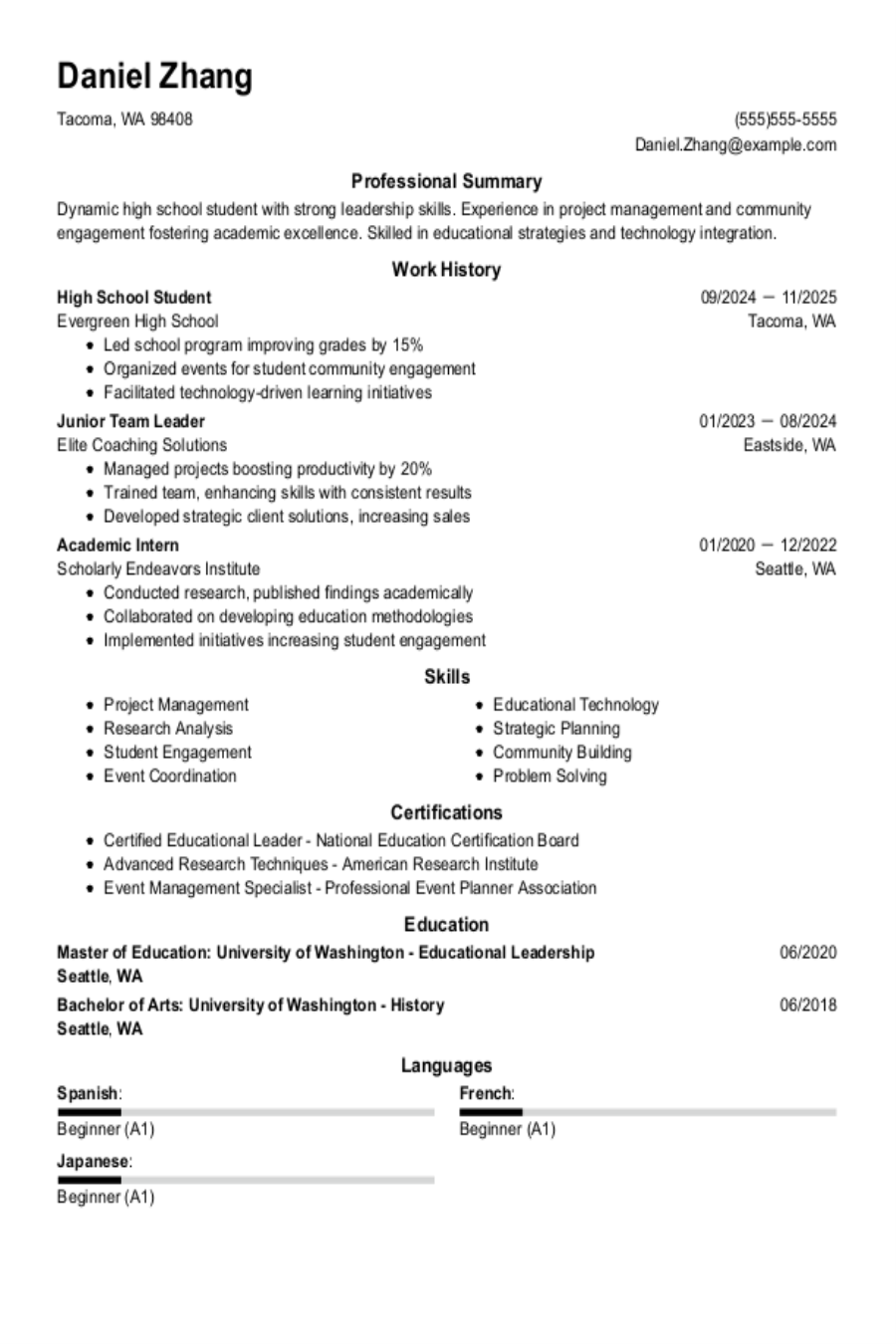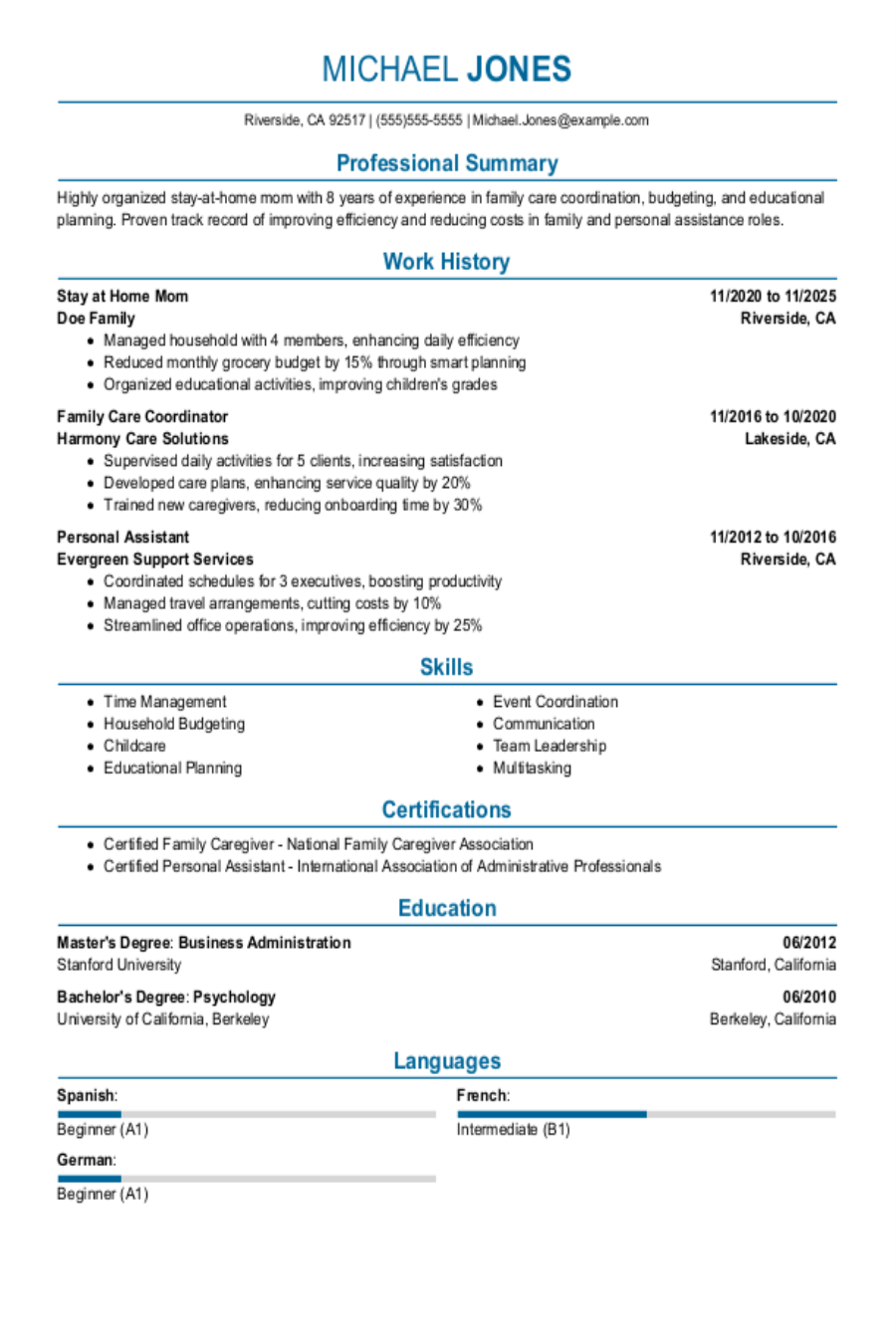Popular College Resume Examples
Entry-level college resume
An entry-level resume for a college student should highlight academic achievements, relevant projects, volunteer experiences, and transferable skills to showcase readiness for professional opportunities despite having limited work history.
Emphasizes soft skills: This job seeker's resume highlights strong soft skills like communication and critical thinking that effectively offset limited experience.
Places skills over experience: Using a functional resume format highlights the candidate's teaching skills and curriculum development expertise, showcasing their ability to improve student performance rather than focusing on limited chronological work experience.
Mid-career college resume
A mid-career college professional's resume should emphasize relevant experience, key skills, and continuous growth in academia to effectively attract the attention of potential employers.
Includes mix of skills: This resume effectively combines hard skills, such as curriculum design and grant writing, with soft skills like mentorship and faculty management to illustrate a well-rounded education professional.
Balances skills and experience: This applicant's resume effectively balances their technical expertise in curriculum design and faculty management with a clear trajectory of professional growth, detailing effective roles that underline their commitment to education excellence.
Experienced college resume
A resume for an experienced college graduate should highlight relevant skills, academic achievements, and any internships or projects that demonstrate their growth and readiness for the workforce.
Embraces modern design: This modern resume template effectively showcases the job seeker's innovative spirit and commitment to excellence, highlighting their strong experience in higher education administration and strategic planning.
Quantifies achievements: Quantifiable achievements significantly improve a job seeker's profile by providing clear metrics that illustrate their impact. This clarity allows recruiters to quickly grasp the job seeker's contributions and effectiveness in previous roles.
No experience college resume
A resume for an applicant with no experience should emphasize academic achievements and relevant coursework to highlight their potential and eagerness to learn.
Overcomes lack of work history: By emphasizing strong skills in event planning and community engagement, the applicant demonstrates readiness for roles in public service, despite limited professional experience.
Avoids jargon: Job seekers often feel pressure to embellish their experience with jargon or complex phrases, thinking it will impress potential employers. However, a straightforward and honest approach is more effective in showcasing genuine skills and contributions.
More resume examples
Additional Guides
- Amazon
- Analyst
- Architecture
- Art
- Artist
- Arts
- Aviation
- Banking
- Billing
- Biology
- Biotech
- Budtender
- Business
- Business Operations
- Cashier
- Chef
- Chemical Engineering
- Chemistry
- Child Care
- Civil Engineering
- College Graduate
- Communications
- Compliance
- Computer
- Computer Hardware
- Computer Science
- Computer Software
- Construction
- Consultant
- Cook
- Copywriting
- Cosmetology
- Culinary
- Customer Service
- Customer Success Manager
- Cyber Security
- Data Systems Administration
- Dentistry
- Driving
- ECommerce
- Education
- Electrical
- Electrical Engineering
- Engineering
- Entertainment
- Entry Level
- Environmental
- Esthetician
- Event Planning
- Executive
- Fashion
- Federal
- Film
- Finance
- Firefighter
- Fitness & Nutrition
- Food Service
- Government
- Graphic Designer
- Handyman
- Healthcare Support
- High School Student
- Hospitality
- Human Resources
- Industrial Engineering
- Insurance
- Interior Design
- Internship
- Inventory Management
- IT
- Janitorial
- Law
- Law Enforcement
- Legal
- Library Museum
- Logistics
- Maintenance
- Manager
- Marketing
- Mechanical Engineering
- Medical
- Mental Health
- Metal Work
- Military
- Music
- Nursing
- Performing Arts
- Pest Control
- Pharmacy Technician
- Photographer
- Physical Therapy
- Pilot
- Plumbing
- Product Manager
- Product Owner
- Production
- Production Assistant
- Program Manager
- Project Manager
- Psychology
- Purchasing
- Quality Control
- Radiologic Technologist
- Real Estate
- Restaurant Manager
- Retail
- Safety Security
- Sales
- Sales Associate
- Scholarship
- Sciences
- Server
- Shipping
- Skilled Trades
- Social Services
- Software Engineer
- Special Education
- Sports
- Statistics
- Stay At Home Mom
- Student
- Supervisor
- Teacher
- Teen
- Training Development
- Transportation
- Travel
- Ux Designer
- Veterinary
- Virtual Assistant
- Waitress
- Web Development
College Resume Template
Looking for a solid foundation? Check out this college resume template that you can easily adapt with your unique details and experiences to showcase your skills.
Min Nguyen
Maplewood, NJ 07044
(555)555-5555
Min.Nguyen@example.com
Professional Summary
Experienced college professor with strong research background. Proven leadership in academic settings. Expertise in advanced data analytics and technology.
Work History
College
Harvard University - Maplewood, NJ
January 2024 - September 2025
- Lectured multiple courses up to 200 students.
- Published research in top-tier journals.
- Mentored 15 doctoral candidates to completion.
Associate Professor
MIT - Newark, NJ
January 2021 - December 2023
- Led department with 10 faculty members.
- Secured $1M in research grants.
- Organized yearly academic symposiums.
Assistant Professor
Boston University - Newark, NJ
January 2019 - December 2020
- Instructed up to 150 undergraduate students.
- Authored 5 peer-reviewed articles.
- Improved student engagement by 20%.
Skills
- Research Methodologies
- Peer-reviewed Publications
- Grant Writing
- Student Mentorship
- Advanced Programming
- Data Analytics
- Course Development
- Academic Administration
Certifications
- Certified Data Scientist - Data Science Academy
- Teaching Excellence Certificate - National Educators Association
Education
PhD Computer Science
Harvard University Cambridge, MA
June 2019
Bachelor Information Technology
MIT Cambridge, MA
June 2015
Languages
- Spanish - Beginner (A1)
- German - Intermediate (B1)
- French - Beginner (A1)
Writing Your College Resume
Having explored these effective resume examples, you're now equipped to dive into the process of how to write a resume. We will walk you through each section carefully, ensuring you understand every aspect along the way.
List your most relevant skills
An effective skills section on your college resume should focus on both hard and soft skills that relate directly to the roles you are applying for. When creating this section, it’s essential to incorporate keywords from the job listing. By doing so, you demonstrate to recruiters that you possess the necessary attributes they seek, making it easier for them to see your fit for the position.
Using these keywords helps human readers and applicant tracking systems recognize your application as relevant. Carefully analyze each job description and tailor your skills section accordingly. Highlighting specific terms will make a strong impression while increasing your chances of passing through initial screenings.
Example of skills on a college resume
- Proficient in using educational software and tools for effective learning
- Strong communicator with the ability to engage diverse audiences
- Adaptable team player focused on collaborative success
- Organized and detail-oriented, ensuring timely completion of assignments
A strong skills section highlights both hard and soft skills, showcasing the applicant's ability to tackle technical tasks while effectively communicating and collaborating with others. This balance is essential for success in today's diverse work environments.
Highlight your work history
When crafting your work experience section, it’s essential to showcase your achievements effectively. This is your opportunity to emphasize how you’ve applied skills in practical settings and made a difference in each role. Use specific examples that demonstrate your contributions, ensuring they are rich in keywords relevant to the college context.
For each job entry, include key details like your title, the organization or employer's name, and the dates of employment. This inclusion helps establish a timeline of experiences and adds credibility to your background.
Example of a college work experience entry
- College
University of Example - Example City, State
August 2021 - May 2025 - Conduct in-depth research for projects, leading to a 25% increase in overall grades through effective data analysis and presentation skills
- Participate actively in group discussions and presentations, improving teamwork and communication abilities while fostering an inclusive learning environment
- Manage multiple academic deadlines efficiently, achieving a cumulative GPA of 3.8 by prioritizing tasks and implementing time management strategies
- Engage with faculty and peers to develop critical thinking skills, resulting in innovative solutions for class assignments and projects
Highlighting outcomes and achievements in your experience section is important because it demonstrates your effectiveness and contributions to previous roles. Employers are more likely to be impressed by specific successes, as they indicate problem-solving abilities and a results-oriented mindset. This strategy not only showcases your skills but also makes you a more memorable job seeker.
Turning school and life experience into job skills
Starting your career in college can feel daunting, especially when you have limited work experience. However, your education and projects are powerful tools that showcase your skills and potential to employers. Courses and academic projects often require critical thinking, teamwork, and problem-solving—qualities that are highly sought after in the workplace.
To highlight relevant experiences, think about the transferable skills you've developed through volunteering, class assignments, or group activities. Skills such as leadership from organizing a study group or communication from presenting a project can be just as impressive as traditional job roles. Every experience counts!
Key areas to mine for transferable skills
- Academic projects: Research papers, Presentations, Group projects, Lab work
- Leadership positions: Club officer, Team captain, Project leader, Event organizer
- Volunteer work: Community service, Nonprofit assistance, Mentoring
- Internships or part-time work: Even brief experiences in professional settings
- Personal projects: Blogs, Websites, Creative work
Include your education
The education section of your college resume should list your academic credentials in reverse-chronological order, starting with your most recent degree. Include degrees and diplomas but feel free to exclude your high school diploma if you have a higher qualification. Highlight any honors or special recognitions that may strengthen this part of your resume.
If you are still pursuing a degree or have incomplete coursework, indicate the highest level of education you've achieved along with an expected graduation date. It is also beneficial to include bullet points that detail relevant coursework projects or achievements, especially for students or recent graduates. This can help demonstrate your knowledge and commitment to your field.
Common certifications for a college resume
- Certified Public Accountant (CPA) – American Institute of Certified Public Accountants (AICPA)
- Chartered Financial Analyst (CFA) – CFA Institute
- Financial Risk Manager (FRM) – Global Association of Risk Professionals (GARP)
- Certified Management Accountant (CMA) – Institute of Management Accountants (IMA)
Sum up your resume with an introduction
Your resume profile is important as it forms the initial impression on potential employers. This section serves as your first opportunity to convey your professional identity and set the tone for the rest of your resume.
For those with substantial experience, a professional summary is an ideal choice. It allows you to succinctly present your most significant achievements and relevant skills right at the forefront of your resume. If you're a fresh graduate or an otherwise inexperienced candidate, write a goals-focused resume objective instead.
Professional summary example
Motivated college graduate with 4 years of hands-on experience in academic research and student engagement. Demonstrated success in developing innovative study programs that improve learning outcomes and foster collaboration among peers. Proficient in data analysis, project management, and effective communication, driving positive results within diverse educational settings.
Resume objective example
Enthusiastic college student eager to apply strong analytical, communication, and teamwork skills in a collaborative environment. Aiming to contribute fresh perspectives and innovative ideas that support project goals and improve overall team performance.
In a competitive job market, your resume profile is your chance to shine. Start by analyzing the job description for relevant keywords and phrases. Incorporate these into your introduction so your resume resonates with both hiring managers and applicant tracking systems, improving your chances of getting noticed.
Add unique sections to set you apart
Improve your resume by including optional sections that highlight your unique qualifications for college positions. These sections allow you to stand out by showcasing experiences beyond your academic achievements.
By adding relevant hobbies or volunteer work, you can provide insight into your personal values and skills. This approach not only reflects your dedication but also illustrates how you engage with the community and develop important competencies. Employers appreciate seeing applicants who actively pursue interests that align with their professional goals, as it paints a fuller picture of who you are as a potential team member.
Three sections perfect for a college resume
- Relevant Coursework: Including academic coursework on your resume is important when work experience is minimal. Highlight 3-4 courses that align with the job description, emphasizing skills and knowledge that directly apply to the role you are pursuing.
- Academic Projects: Listing relevant academic coursework on your resume can effectively demonstrate your foundational knowledge in a specific field. Focus on courses that align with the job requirements to highlight your preparedness for the role. Additionally, showcasing projects on your resume can further illustrate your hands-on experience and practical skills.
- Hobbies and Interests: Including hobbies and interests on a resume can improve your application when they align with the role. For instance, for a college student applying for an internship, involvement in student government or volunteering showcases leadership skills and community engagement.
5 Resume Formatting Tips
- Choose a format that matches your career stage.
Selecting the right resume format is important for showcasing your qualifications. If you have ample experience, a chronological format highlights your career progression effectively.
However, if you're just starting out, consider a functional resume to emphasize your skills and education. A combination format can also serve as a strong option to present both your experience and capabilities. - Pick a smart resume template.
Using a professional resume template improves readability and ensures your information is easy to navigate. A well-structured format captures attention quickly, while premade templates simplify the design process. If you decide to create your own layout, remember to keep it clean and select fonts that are compatible with ATS systems.
- Select an appropriate font.
Choosing a professional font like Helvetica, Georgia, or Garamond can improve resume readability. This ensures your information is easy to read for both ATS systems and hiring managers.
- Use consistent formatting.
Ensure your resume is aligned to the left with uniform margins, creating a polished and professional look that catches the eye of employers.
- Keep your resume to one or two pages.
When crafting your resume, you may find that resumes should be one page long to effectively communicate your skills. However, if you have extensive experience, a second page can be justified. Focus on clarity and relevance to ensure every word counts.
Tools for Your Job Search
Are you gearing up to apply for that perfect college position? Before submitting your application, consider using our ATS Resume Checker. This essential tool provides valuable insights on how well your resume will perform with the automated systems that many educational institutions use for initial screening.
Need help presenting your qualifications? Our AI Resume Builder is here for you! It offers tailored recommendations specific to your academic background, along with professional templates designed to make your experiences stand out to hiring committees.
Frequently Asked Questions
Last Updated: September 30, 2025
Yes. A cover letter is important because it adds depth to your resume and offers you a chance to connect with employers on a personal level. It allows you to express your enthusiasm for the position and explain how your experiences make you an ideal job seeker. So, don’t hesitate—write a cover letter that showcases your unique qualifications!
If you're looking for a quick way to create one, check out our AI Cover Letter Generator. It helps you craft personalized cover letters in just minutes, with various cover letter template options available that match your resume perfectly, enabling a polished and professional presentation of your application.
A resume is a concise document, typically one to two pages long, summarizing your skills and experiences. In contrast, a curriculum vitae (CV) can extend several pages and provides an in-depth account of your academic achievements, research contributions, and professional history.
You should use a CV when applying for roles in academia or specialized fields like law and medicine. If you need to create a tailored CV quickly, use our online CV Maker, which offers various CV templates designed for different industries and career levels. This tool makes it easy to craft a stunning CV that meets your specific needs.
To write a strong CV, focus on structuring your information under clear headings such as Education, Work Experience, and Skills. Select professional templates that are visually appealing and compatible with applicant tracking systems. Tailor your CV for each opportunity by integrating relevant keywords found in the job description to improve your chances of standing out.
Additionally, it's beneficial to review CV examples from industry professionals. This can provide valuable insight into how successful applicants showcase their achievements and qualifications effectively. Use these examples to inspire your own unique presentation style while ensuring it aligns with your personal brand.
A common mistake college students make when applying for jobs is using a generic resume. To stand out, ensure your resume template is Ats-friendly and tailor your content to reflect the job description. This approach increases your chances of getting noticed by hiring managers and landing interviews.
To craft a balanced skills section for college applications, highlight both your technical abilities and soft skills. Mention specific software or tools you've mastered while also emphasizing teamwork, leadership, or communication strengths. In your experience section, illustrate how these skills helped you achieve academic or extracurricular successes.
When applying for college, briefly mention your academic goals in your resume summary. In your cover letter, however, elaborate on your aspirations and how specific programs align with your ambitions. Target colleges that provide opportunities for growth and advancement in your desired field to improve your educational journey.
Was this information helpful? Let us know!
Leisha is a career industry editor dedicated to helping job seekers excel in their careers.
More resources

How to Make a Canadian Resume (Format, Template + Examples)
Creating a Canadian resume is key to getting a job in Canada. ...

How to Write a Resume for an Internal Position (Guide + Examples)
Ready for a new role within the same company? We ll help you...

The Great Workplace Reckoning: How 2025 Burned Out Workers & What’s Next for 2026
The workforce spent much of 2025 in survival mode navigating ...

Student Resume: 2025 Examples & Templates
As a student you need a resume that captures the attention of...

Stay At Home Mom Resume: Examples, Templates and Tips
As a stay-at-home mom building a resume that highlights your ...

Teen Resume: Examples, Template & Advice for Beginners
As a teen entering the job market you need a resume that show...

